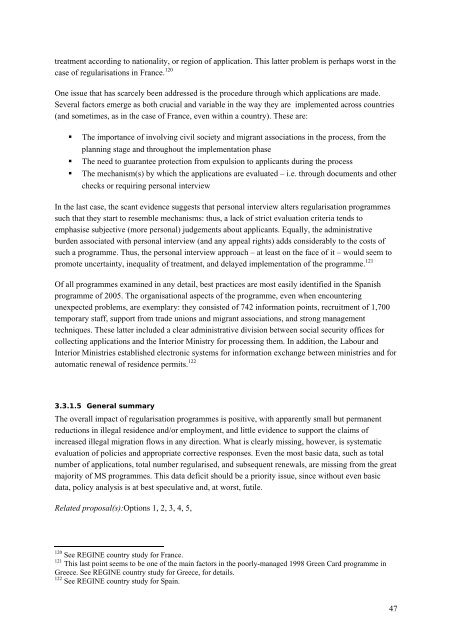REGINE Regularisations in Europe Final Report - European ...
REGINE Regularisations in Europe Final Report - European ...
REGINE Regularisations in Europe Final Report - European ...
You also want an ePaper? Increase the reach of your titles
YUMPU automatically turns print PDFs into web optimized ePapers that Google loves.
treatment accord<strong>in</strong>g to nationality, or region of application. This latter problem is perhaps worst <strong>in</strong> the<br />
case of regularisations <strong>in</strong> France. 120<br />
One issue that has scarcely been addressed is the procedure through which applications are made.<br />
Several factors emerge as both crucial and variable <strong>in</strong> the way they are implemented across countries<br />
(and sometimes, as <strong>in</strong> the case of France, even with<strong>in</strong> a country). These are:<br />
• The importance of <strong>in</strong>volv<strong>in</strong>g civil society and migrant associations <strong>in</strong> the process, from the<br />
plann<strong>in</strong>g stage and throughout the implementation phase<br />
• The need to guarantee protection from expulsion to applicants dur<strong>in</strong>g the process<br />
• The mechanism(s) by which the applications are evaluated – i.e. through documents and other<br />
checks or requir<strong>in</strong>g personal <strong>in</strong>terview<br />
In the last case, the scant evidence suggests that personal <strong>in</strong>terview alters regularisation programmes<br />
such that they start to resemble mechanisms: thus, a lack of strict evaluation criteria tends to<br />
emphasise subjective (more personal) judgements about applicants. Equally, the adm<strong>in</strong>istrative<br />
burden associated with personal <strong>in</strong>terview (and any appeal rights) adds considerably to the costs of<br />
such a programme. Thus, the personal <strong>in</strong>terview approach – at least on the face of it – would seem to<br />
promote uncerta<strong>in</strong>ty, <strong>in</strong>equality of treatment, and delayed implementation of the programme. 121<br />
Of all programmes exam<strong>in</strong>ed <strong>in</strong> any detail, best practices are most easily identified <strong>in</strong> the Spanish<br />
programme of 2005. The organisational aspects of the programme, even when encounter<strong>in</strong>g<br />
unexpected problems, are exemplary: they consisted of 742 <strong>in</strong>formation po<strong>in</strong>ts, recruitment of 1,700<br />
temporary staff, support from trade unions and migrant associations, and strong management<br />
techniques. These latter <strong>in</strong>cluded a clear adm<strong>in</strong>istrative division between social security offices for<br />
collect<strong>in</strong>g applications and the Interior M<strong>in</strong>istry for process<strong>in</strong>g them. In addition, the Labour and<br />
Interior M<strong>in</strong>istries established electronic systems for <strong>in</strong>formation exchange between m<strong>in</strong>istries and for<br />
automatic renewal of residence permits. 122<br />
3.3.1.5 General summary<br />
The overall impact of regularisation programmes is positive, with apparently small but permanent<br />
reductions <strong>in</strong> illegal residence and/or employment, and little evidence to support the claims of<br />
<strong>in</strong>creased illegal migration flows <strong>in</strong> any direction. What is clearly miss<strong>in</strong>g, however, is systematic<br />
evaluation of policies and appropriate corrective responses. Even the most basic data, such as total<br />
number of applications, total number regularised, and subsequent renewals, are miss<strong>in</strong>g from the great<br />
majority of MS programmes. This data deficit should be a priority issue, s<strong>in</strong>ce without even basic<br />
data, policy analysis is at best speculative and, at worst, futile.<br />
Related proposal(s):Options 1, 2, 3, 4, 5,<br />
120 See <strong>REGINE</strong> country study for France.<br />
121 This last po<strong>in</strong>t seems to be one of the ma<strong>in</strong> factors <strong>in</strong> the poorly-managed 1998 Green Card programme <strong>in</strong><br />
Greece. See <strong>REGINE</strong> country study for Greece, for details.<br />
122 See <strong>REGINE</strong> country study for Spa<strong>in</strong>.<br />
47
















